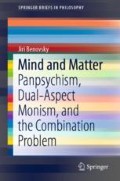Abstract
This chapter provides indirect motivation for dual-aspect-pan-proto-psychism by highlighting the places where more standard solutions to the mind-body problem fail. Emergentism is rejected, and well-known serious weaknesses of various types of physicalism and dualism are pointed out.
Access this chapter
Tax calculation will be finalised at checkout
Purchases are for personal use only
Notes
- 1.
- 2.
Yes, functionalism is a kind of reductionism, since it reduces mental properties to a functional role they play. Under functionalism, ontologically speaking, only brain states and brain processes exist. But this is not the place to argue for this claim.
- 3.
On the interesting difference between physicalism and physicSalism, see Strawson (2006, p. 54): “[…] real physicalism can have nothing to do with physicsalism, the view—the faith—that the nature or essence of all concrete reality can in principle be fully captured in the terms of physics. Real physicalism cannot have anything to do with physicsalism unless it is supposed—obviously falsely—that the terms of physics can fully capture the nature or essence of experience.”
- 4.
“The Terminator 2: Judgment Day”, 1991, James Cameron.
- 5.
In Goff’s (2017a, p. 3 and 14) terminology, physicalism is unable to respect the Consciousness Constraint: “The Consciousness Constraint—Any adequate theory of reality must entail that at least some phenomenal concepts are satisfied. (A concept is satisfied when it truly corresponds to reality, for example, the concept of God is satisfied if and only if God exists.)” See also Goff's (2017a) Chap. 2.
- 6.
Supervenience is standardly defined as follows: “A set of properties A supervenes upon another set B just in case no two things can differ with respect to A-properties without also differing with respect to their B-properties. In slogan form, ‘there cannot be an A-difference without a B-difference’” (Bennett and McLaughlin 2005).
- 7.
See Descartes’ “Sixth Meditation”: “One the one hand I have a clear and distinct idea of myself, in so far as I am simply a thinking, non-extended thing; and on the other hand I have a distinct idea of my body, in so far as this is simply an extended, non-thinking thing. And accordingly, it is certain that I am really distinct from my body, and can exist without it” (Descartes 1984).
References
Chalmers, DJ (1996) The conscious mind. Oxford University Press
Chalmers D (2013) Panpsychism and panprotopsychism. Amherst Lect Philo 2013. Also in Alter T, Nagasawa Y (eds), Russellian monism. Oxford University Press, 2015; and in Bruntrup G, Jaskolla L (eds), Panpsychism. Oxford University Press, 2016
Chalmers D (2016) The combination problem for panpsychism. In: Bruntrup G, Jaskolla L (eds) Panpsychism. Oxford University Press
Coleman S (2014) The real combination problem: panpsychism, micro-subjects, and emergence. Erkenntnis 79:19–44
Coleman S (2016) Panpsychism and neutral monism: how to make up one’s mind. In: Bruntrup G, Jaskolla L (eds) Panpsychism. Oxford University Press
Descartes R (1984) Meditations. In: The philosophical writings of descartes, translated by Cottingham J, Stoothoff R, Murdoch D. Cambridge University Press
Goff P (2009) Why panpsychism doesn’t help us explain consciousness. Dialectica 63(3):289–311
Goff P (2017a) Consciousness and fundamental reality. Oxford University Press
Goff P (2017b) Panpsychism. Stanf Encycl Philos. https://plato.stanford.edu/entries/panpsychism
Strawson G (2003) Real materialism. In: Antony L, Hornstein N (eds) Chomsky and his critics; reprinted in Strawson G (ed) Real materialism and other essays. Oxford Clarendon Press, 2008
Strawson G (2006) Realistic monism—why physicalism entails panpsychism. J Conscious Stud 13(10–11):3–31
Strawson G (2016) Mind and being: the primary of panpsychism. In: Bruntrup G, Jaskolla L (eds) Panpsychism. Oxford University Press
Author information
Authors and Affiliations
Corresponding author
Rights and permissions
Copyright information
© 2018 The Author(s)
About this chapter
Cite this chapter
Benovsky, J. (2018). The Mind-Body Problem, the Standard Failures of the Standard Solutions to It, and the Threat of Emergentism. In: Mind and Matter. SpringerBriefs in Philosophy. Springer, Cham. https://doi.org/10.1007/978-3-030-05633-9_2
Download citation
DOI: https://doi.org/10.1007/978-3-030-05633-9_2
Published:
Publisher Name: Springer, Cham
Print ISBN: 978-3-030-05632-2
Online ISBN: 978-3-030-05633-9
eBook Packages: Religion and PhilosophyPhilosophy and Religion (R0)

